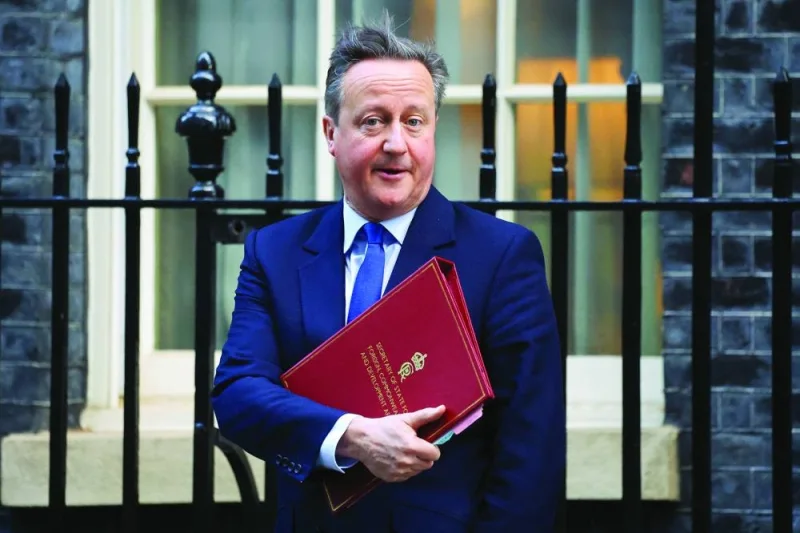
British Foreign Secretary David Cameron leaves following a cabinet meeting at 10 Downing Street in London.
British government lawyers do not believe Israel has breached international law in its military campaign in Gaza, Foreign Secretary David Cameron said on Tuesday. But the former prime minister told parliament’s Foreign Affairs Committee that some of the things he had seen during the war in the besieged Palestinian territory were “deeply concerning”.
“Am I worried that Israel has taken action that might be in breach of international law, because this particular premises has been bombed or whatever?” he said. “Yes, of course I’m worried about that.” Cameron was pushed repeatedly on the legality of Israel’s response. Israel’s relentless bombardment and a ground invasion of Gaza have killed at least 23,210 people, mostly women and children, according to the Gaza’s health ministry.
The Foreign Affairs Committee scrutinises the work of Britain’s foreign ministry, to which Cameron was appointed in a shock move late last year. Asked by Conservative MP Bob Seely whether government lawyers had advised that Israel might be “vulnerable to a challenge” from the International Criminal Court in The Hague, Cameron replied: “It’s close to that.” But he said there was “always a question mark”, which was why closer scrutiny, including from lawyers, was required. “The advice has been so far that they (Israel) have the commitment, the capability and the compliance,” he added.
Cameron, who now sits in parliament’s unelected upper chamber, said it would take “a giant international effort” to rebuild Gaza after the conflict because “the level of destruction is so great”. “We’re going to need as many people as possible. It will take more than any one country to do it,” the foreign secretary told MPs.
He also said that he had seen figures showing that Hamas fighters had “lost over 50% of their capability and capacity” to fire rockets into Israel. Tuesday’s hearing was the first time MPs had the opportunity to question Cameron since he became foreign secretary because he does not sit in the House of Commons as an elected lawmaker.
Cameron, in power from 2010 until he stepped down after losing the 2016 Brexit vote, called on US lawmakers to approve a $250mn military assistance package for Ukraine that Republicans in Congress are currently blocking.
“We really need the Americans to come forward with this package. I’m pretty confident that they will, because ultimately, there is a majority in Congress for it,” he said.
“Am I worried that Israel has taken action that might be in breach of international law, because this particular premises has been bombed or whatever?” he said. “Yes, of course I’m worried about that.” Cameron was pushed repeatedly on the legality of Israel’s response. Israel’s relentless bombardment and a ground invasion of Gaza have killed at least 23,210 people, mostly women and children, according to the Gaza’s health ministry.
The Foreign Affairs Committee scrutinises the work of Britain’s foreign ministry, to which Cameron was appointed in a shock move late last year. Asked by Conservative MP Bob Seely whether government lawyers had advised that Israel might be “vulnerable to a challenge” from the International Criminal Court in The Hague, Cameron replied: “It’s close to that.” But he said there was “always a question mark”, which was why closer scrutiny, including from lawyers, was required. “The advice has been so far that they (Israel) have the commitment, the capability and the compliance,” he added.
Cameron, who now sits in parliament’s unelected upper chamber, said it would take “a giant international effort” to rebuild Gaza after the conflict because “the level of destruction is so great”. “We’re going to need as many people as possible. It will take more than any one country to do it,” the foreign secretary told MPs.
He also said that he had seen figures showing that Hamas fighters had “lost over 50% of their capability and capacity” to fire rockets into Israel. Tuesday’s hearing was the first time MPs had the opportunity to question Cameron since he became foreign secretary because he does not sit in the House of Commons as an elected lawmaker.
Cameron, in power from 2010 until he stepped down after losing the 2016 Brexit vote, called on US lawmakers to approve a $250mn military assistance package for Ukraine that Republicans in Congress are currently blocking.
“We really need the Americans to come forward with this package. I’m pretty confident that they will, because ultimately, there is a majority in Congress for it,” he said.
Source link
 Kokani.me Kokani.me
Kokani.me Kokani.me



